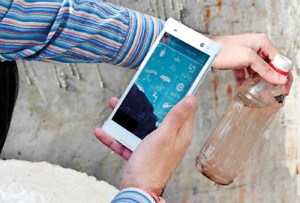Sunday Times 2
Defeating dengue the smart way
[KARACHI] Pakistan’s Sindh province is gearing up to launch this month (February) a dengue prediction system based on surveillance data gathered in real time using a smartphone app and fed into a spatial or geographical model.
Currently Karachi, the provincial capital, and other cities in Sindh – a province with a population of 45 million people – depend on blanket fumigation drives and ‘fogging’ with chemicals to reduce populations of the Aedes aegypti mosquito, the primary dengue vector.
The dengue surveillance model using spatial technology was designed by the Pakistan Space and Upper Atmosphere Research Commission (SUPARCO), says Shakil Malik, head of Sindh’s dengue control programme.
Malik tells SciDev.Net that spatial mapping using geographical information systems (GIS) helps identify disease hotspots so that possible outbreaks can be pre-empted. “Larvae collected from hotspots can be genotyped to identify virus strains allowing prompt and precise intervention,” he says.
Umar Saif, vice chancellor of the Information Technology University, Pakistan tells SciDev.Net that a smartphone-driven programme has already proved its usefulness during a 2011 outbreak in Lahore, the provincial capital of Punjab.
In Punjab, android phones loaded with an early warning app were distributed to workers and government officials who used them to record the location and timing of confirmed dengue cases, and larvae-infested stagnant water in pools or containers.
“We were able to record almost 1.7 million entries from 4,000 – 5,000 of our field workers in Lahore over two years,” Saif said, adding that the success of the Sindh programme would depend on the quality and quantity of data entered by those entrusted with collection.
Pakistan’s first confirmed dengue outbreak was reported in 1994 and since November 2005 Karachi has recorded the disease annually. Figures were not available for 2014, but a total of 5,750 confirmed cases of dengue were reported in Sindh province in 2013 while figures were not available for 2014.
Dengue starts with flu-like symptoms that can develop into potentially lethal complications.
Each year, more than 100 million people worldwide catch dengue and over 2.5 billion people are at risk from a disease dubbed ‘breakbone fever’ for the excruciating joint and muscle pain it often causes.
Courtesy scidev.net

